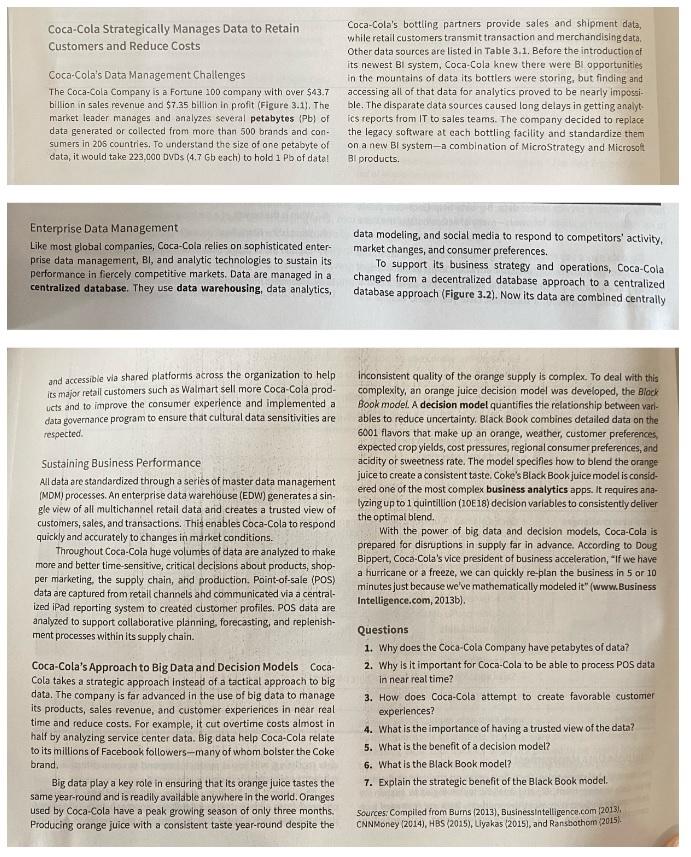Answered step by step
Verified Expert Solution
Question
1 Approved Answer
Coca-Cola Strategically Manages Data to Retain Customers and Reduce Costs Coca-Cola's Data Management Challenges The Coca-Cola Company is a Fortune 100 company with over

Coca-Cola Strategically Manages Data to Retain Customers and Reduce Costs Coca-Cola's Data Management Challenges The Coca-Cola Company is a Fortune 100 company with over $43.7 billion in sales revenue and $7.35 billion in profit (Figure 3.1). The market leader manages and analyzes several petabytes (Pb) of data generated or collected from more than 500 brands and con- sumers in 206 countries. To understand the size of one petabyte of data, it would take 223,000 DVDs (4.7 Gb each) to hold 1 Pb of data! Enterprise Data Management Like most global companies, Coca-Cola relies on sophisticated enter- prise data management, BI, and analytic technologies to sustain its performance in fiercely competitive markets. Data are managed in a centralized database. They use data warehousing, data analytics, and accessible via shared platforms across the organization to help its major retail customers such as Walmart sell more Coca-Cola prod- ucts and to improve the consumer experience and implemented a data governance program to ensure that cultural data sensitivities are respected. Sustaining Business Performance All data are standardized through a series of master data management (MDM) processes. An enterprise data warehouse (EDW) generates a sin- gle view of all multichannel retail data and creates a trusted view of customers, sales, and transactions. This enables Coca-Cola to respond quickly and accurately to changes in market conditions. Throughout Coca-Cola huge volumes of data are analyzed to make more and better time-sensitive, critical decisions about products, shop- per marketing, the supply chain, and production. Point-of-sale (POS) data are captured from retail channels and communicated via a central- ized iPad reporting system to created customer profiles. POS data are analyzed to support collaborative planning, forecasting, and replenish- ment processes within its supply chain. Coca-Cola's Approach to Big Data and Decision Models Coca- Cola takes a strategic approach instead of a tactical approach to big data. The company is far advanced in the use of big data to manage its products, sales revenue, and customer experiences in near real time and reduce costs. For example, it cut overtime costs almost in half by analyzing service center data. Big data help Coca-Cola relate to its millions of Facebook followers-many of whom bolster the Coke brand. Big data play a key role in ensuring that its orange juice tastes the same year-round and is readily available anywhere in the world. Oranges used by Coca-Cola have a peak growing season of only three months. Producing orange juice with a consistent taste year-round despite the Coca-Cola's bottling partners provide sales and shipment data, while retail customers transmit transaction and merchandising data. Other data sources are listed in Table 3.1. Before the introduction of its newest Bl system, Coca-Cola knew there were Bl opportunities in the mountains of data its bottlers were storing, but finding and accessing all of that data for analytics proved to be nearly impossi- ble. The disparate data sources caused long delays in getting analyt ics reports from IT to sales teams. The company decided to replace the legacy software at each bottling facility and standardize them on a new Bl system-a combination of MicroStrategy and Microsoft Bl products. data modeling, and social media to respond to competitors' activity. market changes, and consumer preferences. To support its business strategy and operations, Coca-Cola changed from a decentralized database approach to a centralized database approach (Figure 3.2). Now its data are combined centrally inconsistent quality of the orange supply is complex. To deal with this complexity, an orange juice decision model was developed, the Black Book model. A decision model quantifies the relationship between vari- ables to reduce uncertainty. Black Book combines detailed data on the 6001 flavors that make up an orange, weather, customer preferences, expected crop yields, cost pressures, regional consumer preferences, and acidity or sweetness rate. The model specifies how to blend the orange juice to create a consistent taste. Coke's Black Book juice model is consid- ered one of the most complex business analytics apps. It requires ana- lyzing up to 1 quintillion (10E18) decision variables to consistently deliver the optimal blend. With the power of big data and decision models, Coca-Cola is prepared for disruptions in supply far in advance. According to Doug Bippert, Coca-Cola's vice president of business acceleration, "If we have a hurricane or a freeze, we can quickly re-plan the business in 5 or 10 minutes just because we've mathematically modeled it" (www.Business Intelligence.com, 2013b). Questions 1. Why does the Coca-Cola Company have petabytes of data? 2. Why is it important for Coca-Cola to be able to process POS data in near real time? 3. How does Coca-Cola attempt to create favorable customer experiences? 4. What is the importance of having a trusted view of the data? 5. What is the benefit of a decision model? 6. What is the Black Book model? 7. Explain the strategic benefit of the Black Book model. Sources: Compiled from Burns (2013), Business Intelligence.com [2013), CNNMoney (2014), HBS (2015), Liyakas (2015), and Ransbothom (2015).
Step by Step Solution
★★★★★
3.40 Rating (166 Votes )
There are 3 Steps involved in it
Step: 1
1 Their advance enterprise solution quickly generates a single view of multi channel information and ...
Get Instant Access to Expert-Tailored Solutions
See step-by-step solutions with expert insights and AI powered tools for academic success
Step: 2

Step: 3

Ace Your Homework with AI
Get the answers you need in no time with our AI-driven, step-by-step assistance
Get Started


